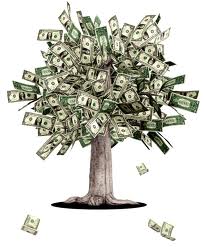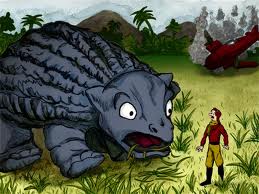What is Money?
 Friday, March 15, 2013 at 3:00AM
Friday, March 15, 2013 at 3:00AM  Money makes the world go around. You would think this question has an easy answer. It doesn't. The Federal Reserve has many different definitions. Here is one definition from the Federal Reserve:
Money makes the world go around. You would think this question has an easy answer. It doesn't. The Federal Reserve has many different definitions. Here is one definition from the Federal Reserve:
The money supply is commonly defined to be a group of safe assets that households and businesses can use to make payments or to hold as short-term investments. For example, U.S. currency and balances held in checking accounts and savings accounts are included in many measures of the money supply.
Here is an example of recent money supply calculations based on two different definitions of Money from the Fed. If you can figure it out, you are a smarter person than I. Or maybe you have more time than I do! Or you could read the Wiki entry on the money supply. I did until I had a bad case of EGO—eyes glazed over.
So after much reading and thought I decided to present my own amateur musings. Hopefully you will conclude that I am a talented amateur.
 Some people actually think that money grows on trees-more on this next week. The primary category of "money" is wealth that can be accessed immediately—currency, savings accounts, checking accounts, and here is where I probably disagree with many…short-term treasury bills.
Some people actually think that money grows on trees-more on this next week. The primary category of "money" is wealth that can be accessed immediately—currency, savings accounts, checking accounts, and here is where I probably disagree with many…short-term treasury bills.
Secondary "money" would be financial assets that are highly liquid and have a small transaction cost: stocks, CD's at a bank, gold, silver, and other semi-monetary metals, or medium-term debt from the government.
Tertiary "money" would be real estate, corporate bonds, and long-term government debt. These have either high transaction costs or interest rate risk, or both. In my view anything in an IRA or a 401K would be in this category.
Quaternary "money" would be things like collectables and derivatives.
So what is money? How about real estate with a line of credit on it? You just pick up a phone and voilà, the money is in your checking account and you can spend it. Is this "money"? Or what about Apple stock? One call to your broker and it is in your account and it can be spent. Apple has been volatile lately, but the transaction costs on stock sales keeps dropping. Is an investment in Apple stock money?
Before I answer these questions, you probably have another question. "Why does this matter?" It matters because we all like to plan for the future; I hope you do anyway. So among the hard money types the question of the moment is “Are we headed for deflation?” Mish Shedlock would be in this school. Or, are we headed toward hyperinflation? Peter Schiff is in that school. John Mauldin speaking at the Cambridge House seminars I attended offered a third way.
This would be just as true with a picture of Bush.Who is right? If you define money as in my first definition, we are in an inflationary period. Hooray for Peter Schiff. If you use the second definition we seem to be in a neutral period. Hooray for John Mauldin. If you use definition three then we are in a deflationary period. Hooray for Mish Shedlock. (Even Peter Schiff thinks real estate is grossly over-valued, and sorry Peter, but this is deflationary.) If you include the fourth definition of money, then it changes nothing but does manage to intensify the alternatives.
We cannot trust the definition of money. We cannot trust the price increases announced by the government CPI, Consumer Price Index. If we use the same method that kept Jimmy Carter from being reelected, our inflation rate is 5 to 7%. Remember that Nixon was horrified and instituted wage and price controls when inflation was at 4%. Even if inflation was the 2% the government insists that it is, a 22-year-old college graduate just now entering the work force, good luck by-the-way, would have 90% of whatever he saves today stolen from him over his 45 year working life. Yes, inflation is "only" 2%! We cannot trust the government announced unemployment rate.
We are screwed. This is not the word I wanted to use but this is a family-oriented blog.
What is money? I have no idea. Yogi Berra was right. “It is difficult to make predictions, especially about the future.” Liza Minnelli and Joel Grey were right too.
I have decided to conclude with an analogy. Imagine you are in a plane in a blinding hailstorm. The plane's navigation systems fail, just as our financial system is mostly failing today.  After the financial plane crash you might be eaten by dinosaurs! Co-pilot Schiff says we will crash and die and we will all go to inflationary hell. Co-pilot Shedlock thinks we will crash, and the plane will be a total loss and we will go to deflationary purgatory. Co-pilot Mauldin thinks we will crash, but we will repair the plane and fly again to heaven. I might wish that Mauldin is right, but I would not rely on it. I plan to talk about Mauldin and his theories on Tuesday.
After the financial plane crash you might be eaten by dinosaurs! Co-pilot Schiff says we will crash and die and we will all go to inflationary hell. Co-pilot Shedlock thinks we will crash, and the plane will be a total loss and we will go to deflationary purgatory. Co-pilot Mauldin thinks we will crash, but we will repair the plane and fly again to heaven. I might wish that Mauldin is right, but I would not rely on it. I plan to talk about Mauldin and his theories on Tuesday.
I remain guardedly pessimistic.
In the meantime, here is an interview with another opinion, this time by co-pilot Gary Schilling. He thinks that everything is A-OK and that there is no reason to worry, the plane will have a safe, but bumpy landing. I think in the short run he is right, the government will spend money and sell bonds until it doesn't, then the plane will hit the ground.
Are you wearing your financial seat belt?
Thanks to Eric Anderson at Universe of Lies for pointing out this video.

Reader Comments